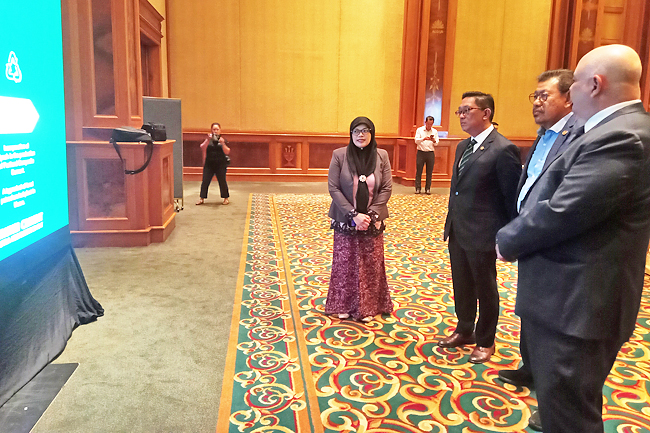Investing in energy-efficient construction will significantly improve sustainability and resilience in Brunei Darussalam, where the tropical climate can be quite challenging, said Permanent Secretary (Infrastructure, Housing and Professional) at the Ministry of Development (MoD) Ir Haji Amer Hishamuddin bin Pehin Orang Kaya Amar Pahlawan Dato Seri Setia Haji Zakaria.
By sourcing materials locally and selecting those with lower environmental impact, reliance on resource-intensive imports can be reduced and waste minimised, he said during the second installment of the Green Construction Dialogue 2023 at The Empire Brunei yesterday.
“This approach not only supports local industries but also helps protect our fragile ecosystems and reduces carbon emissions,” he added.
The permanent secretary also said that investing in sustainable building practices will help create new job opportunities, stimulate innovation in the construction industry, and open doors to international markets seeking eco-friendly technologies and designs.
Authority for Building Control and Construction Industry (ABCi) and various stakeholders including the Department of Energy, Public Works Department (JKR) and non-governmental organisations (NGOs), have introduced initiatives towards Green Construction in the past few years.
In 2022, ABCi updated the rating tool by incorporating the Department of Energy’s energy efficiency standards which specify minimum energy performance requirements of electrical products to reduce power usage and greenhouse gas emissions.

The MoD is now looking into introducing incentives through planning guidelines to encourage new buildings in the private sector to be green buildings.
Last year, ABCi introduced the Sustainable Products Scheme, which allows for the registration of sustainable products and materials for the construction industry aligning with its needs towards sustainable development.
“As to date, there are more than 80 approved applications of sustainable products scheme. We are expecting more registrations in the near future. It should be noted that the scheme also covers the registration of local products to be used in the construction industry, due to its more ideal carbon footprint impacts compared to imported products,” Ir Haji Amer Hishamuddin said, adding that it will give more opportunities for local products to be used in the industry.
As a Party to the UN Framework Convention on Climate Change (UNFCCC), Brunei ratified the Paris Agreement, and through it communicated the nationally determined contributions, aiming to reduce its emissions by 20 per cent against business-as-usual levels by 2030.
The Brunei Darussalam National Climate Change Policy (BNCCP) outlines 10 key strategies to achieve this target. Since the launch of the BNCCP, Brunei has achieved above target emissions reduction in the past two years, according to the permanent secretary.
The BNCCP’s stated objective is for all sectors of the economy to move “Towards a Low Carbon and Climate-Resilient Brunei Darussalam”. At UN Climate Change Conference in Glasgow in 2021, Brunei presented its ambition to move towards net zero by 2050.
“We therefore urge the construction industry in the country, as a major economic sector, to contribute to the net-zero targets through sustainable construction or Green Construction,” he said.
“The MoD is committed in ensuring that government construction projects are delivered sustainably when possible.”
For instance, the Housing Development Department has delivered homes for the citizens with a Green Mark Ratings, such as the 300 Lambak Kanan apartments and 1,000 homes under Lugu Cluster Housing.
“In addition, 1,000 houses in Lugu and 950 houses in the Tanah Jambu housing schemes, under construction, have been specified to a Green Mark rating.
“The JKR has been replacing old air-conditioning chillers with energy efficient chillers in government buildings and replaced traditional lighting with LED bulbs.”
The government will incorporate green building features for all new government buildings, incorporating energy efficient designs, water conservation and using sustainable products.
Following the success of pilot solar photovoltaic (PV) installations in Temburong District, more solar PVs will be installed on rooftops of government buildings whenever possible, Ir Haji Amer Hishamuddin said.
Themed ‘Towards a carbon neutral construction industry’, the event was organised by Butra HeidelbergCement Sdn Bhd of the Heidelberg Materials Group, carrying the objective of contributing towards the development of a well-informed public-private decision in driving the construction industry forward towards sustainability.
The key point of these discussions was to explore on what it takes to adapt net-zero or de-carbonisation initiatives in the building and construction industry, specifically through guidelines and public-private engagement. – Azlan Othman
Credit: Source link
